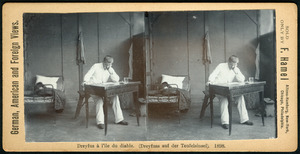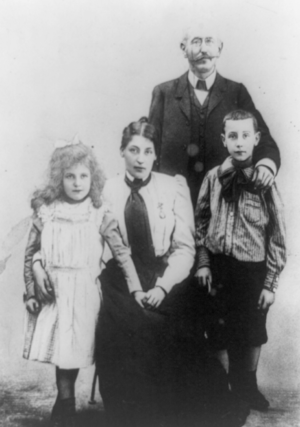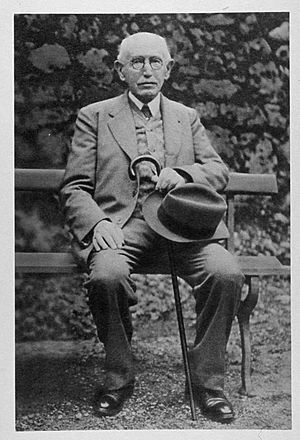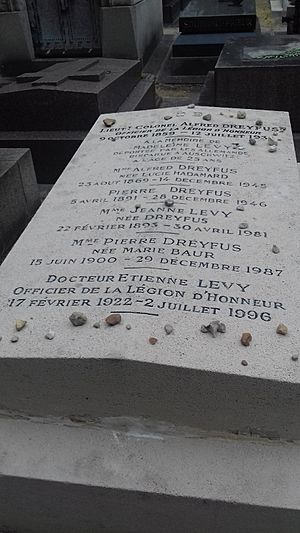Alfred Dreyfus facts for kids
Quick facts for kids
Alfred Dreyfus
|
|
|---|---|
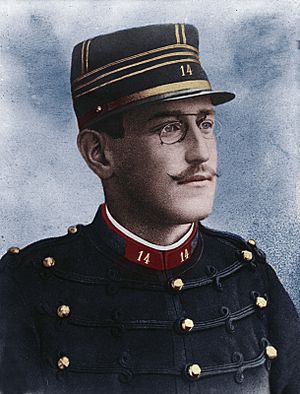
Alfred Dreyfus c. 1894
|
|
| Personal details | |
| Born | 9 October 1859 Mulhouse, French Empire |
| Died | 12 July 1935 (aged 75) Paris, French Republic |
| Resting place | Cimetière du Montparnasse 48°50′17″N 2°19′37″E / 48.83806°N 2.32694°E |
| Nationality | French |
| Spouse |
Lucie Eugénie Hadamard
(m. 1890) |
| Children | Pierre Dreyfus Jeanne Dreyfus Levy |
| Parents |
|
| Alma mater | École Polytechnique École Supérieure de Guerre |
| Signature | |
| Military service | |
| Allegiance | |
| Branch/service | French Army |
| Years of service | 1880 – 1918 |
| Rank | |
| Unit |
|
| Battles/wars |
|
Alfred Dreyfus (9 October 1859 – 12 July 1935) was a French army officer. He was of Jewish background from Alsace, a region in France. In 1894, he was wrongly accused and found guilty of treason. This event became one of the biggest political scandals in modern French history.
This famous event is known as the Dreyfus affair. It caused a lot of discussion and anger across Europe. In the end, Alfred Dreyfus was proven innocent and cleared of all charges.
Contents
Early Life and Education
Alfred Dreyfus was born in Mulhouse, Alsace, in 1859. He was the youngest of nine children. His father, Raphaël Dreyfus, was a successful Jewish textile maker.
When Alfred was 10, the Franco-Prussian War started in 1870. After the war, Germany took over Alsace-Lorraine. Because of this, Alfred and his family moved to Basel, Switzerland. He went to high school there. Later, his family moved to Paris.
Early Career in the Military
Seeing his family leave their home because of the war made Dreyfus want to join the military. In October 1877, at age 18, he joined the special École Polytechnique military school in Paris. There, he learned about military tactics and science.
In 1880, he finished school and became a sub-lieutenant in the French army. He then went to artillery school to become a specialized artillery officer. After graduating, he joined the 31st Artillery Regiment. He was later promoted to lieutenant in 1885. In 1889, he became a captain.
On 18 April 1891, Dreyfus married Lucie Eugénie Hadamard. They had two children, Pierre and Jeanne. Soon after his wedding, Dreyfus was accepted into the École Supérieure de Guerre, also known as the War College. Two years later, he graduated as one of the top students. He was then chosen to train at the French Army's General Staff headquarters. He was the only Jewish officer there.
During his exams at the War College, one of the judges, General Bonnefond, said that "Jews were not wanted" on the staff. He gave Dreyfus low marks for "likability." This lowered Dreyfus's overall grade. Dreyfus and another Jewish officer protested this unfairness. The school director felt bad but said he could not do anything. This protest later worked against Dreyfus. Even though the French army had many Jewish officers, some people in the General Staff shared General Bonnefond's unfair views.
The Dreyfus Affair
In 1894, a torn-up note was found in a wastebasket at the German Embassy. This note, called the bordereau, described a small French military secret. It was clear that a spy in the French military had written it.
The French Army's spy-catching team, led by Lieutenant Colonel Jean Sandherr, realized that someone was giving secrets to the German military. They quickly suspected Dreyfus. He was arrested for treason on 15 October 1894.
On 5 January 1895, Dreyfus was quickly found guilty in a secret military trial. He was publicly stripped of his army rank and sent to Devil's Island in French Guiana for life. His uniform was cut, and his sword was broken in front of soldiers and a large crowd. Dreyfus shouted, "I swear that I am innocent. I remain worthy of serving in the Army. Long live France! Long live the Army!"
In August 1896, the new head of French military intelligence, Lieutenant Colonel Georges Picquart, found proof that the real spy was Major Ferdinand Walsin Esterhazy. Picquart was sent away to Tunisia to keep him quiet.
When news of the army's cover-up and Dreyfus's possible innocence leaked, a big debate started. People argued about anti-Jewish feelings and what France stood for. Esterhazy was found not guilty by a secret military court. He then secretly fled to England.
Rachel Beer, an editor for English newspapers, interviewed Esterhazy in London. He confessed to her, saying, "I wrote the bordereau." She published his confession in September 1898. She also wrote an article accusing the French military of anti-Jewish bias and demanded a new trial for Dreyfus.
In France, many people, including famous artists like Émile Zola, supported Dreyfus. Because of this, he was given a second trial in 1899. But even with proof of his innocence, he was again found guilty of treason.
However, because of strong public opinion, President Émile Loubet offered Dreyfus a pardon in 1899. Dreyfus accepted it and was released from prison. This was a way for the military to save face after their mistake. For two years, he lived under house arrest.
On 12 July 1906, Dreyfus was officially cleared of all charges by a military group. The next day, he was allowed back into the army and promoted to major. A week later, he received the Legion of Honour, a very important award.
Aftermath of the Affair
On 4 June 1908, Dreyfus was at a ceremony in Paris. A right-wing journalist, Louis Grégori, shot him in the arm. Grégori was found not guilty by the court. He claimed he only meant to graze Dreyfus, not kill him.
In 1937, Dreyfus's son, Pierre, published his father's letters and memories. The book was called Souvenirs et Correspondance.
In October 2021, French President Emmanuel Macron opened a museum about the Dreyfus affair. He said that nothing could fix the unfairness Dreyfus suffered. He added, "let us not aggravate it by forgetting, deepening or repeating them." This was a message against those who still try to question Dreyfus's innocence today.
Later Life
World War I Service
Being in prison on Devil's Island had made Dreyfus's health worse. He retired from the army in October 1907. But when World War I started, he rejoined the army as an artillery major. He served throughout the war and was promoted to lieutenant colonel.
Dreyfus was in his mid-50s during the war. He mostly served behind the front lines, helping with artillery supplies. But he also served on the front lines in 1917, including at the Battle of Verdun. He was promoted to Officer of the Legion of Honour in November 1918.
Dreyfus's son, Pierre, also served in the war as an artillery officer. He received the Croix de guerre, a military medal.
Death and Legacy
Alfred Dreyfus died in Paris on 12 July 1935, at age 75. This was exactly 29 years after he was cleared of all charges. His funeral procession passed through Paris on Bastille Day. He was buried in the Cimetière du Montparnasse in Paris.
A statue of Dreyfus holding his broken sword stands in Paris. Another copy of the statue is at the Museum of Jewish Art and History in Paris.
Dreyfus's wife, Lucie, who fought hard for his innocence, hid during the German occupation of France. Their son, Pierre, escaped to the United States. Their daughter, Jeanne, also survived. However, their granddaughter, Madeleine Levy, was arrested and died in Auschwitz in 1944.
Legacy and Museum
Dreyfus's grandchildren gave over three thousand documents to the Musée d'Art et d'Histoire du Judaïsme (Museum of Jewish Art and History). These included personal letters, photos from the trial, legal papers, and his officer stripes. In 2006, the museum created an online platform about the Dreyfus Affair.
Military Ranks and Awards
Ranks in the French Army
Alfred Dreyfus achieved several ranks during his service in the French Army.
| Ranks attained in the French Army | |||||
|---|---|---|---|---|---|
| Student | Sous-lieutenant | Lieutenant | Capitaine | Chef d'escadrons | Lieutenant-colonel |
| 1 October 1878 | 4 October 1880 | 1 November 1882 | 12 September 1889 | 13 July 1906 | 26 September 1918 |
Honours and Decorations
Dreyfus received important national honours and military decorations for his service.
| Ribbon bar | Honour |
|---|---|
| Knight of the National Order of the Legion of Honour - 21 July 1906 | |
| Officer of the National Order of the Legion of Honour - 21 January 1919 |
| Ribbon bar | Honour |
|---|---|
| War Cross 1914–1918 | |
| 1914–1918 Commemorative war medal |
See also
 In Spanish: Alfred Dreyfus para niños
In Spanish: Alfred Dreyfus para niños
- Florence Earle Coates, a poet who wrote poems about the Dreyfus affair.
- Jack Dreyfus, a relative and founder of the Dreyfus Funds.
- Gérard Louis-Dreyfus, a distant relative and American businessman.
- Julia Louis-Dreyfus, a distant relative and American actress.
- J'Accuse…!, a famous letter written by Émile Zola about the affair.
- Theodor Herzl, a journalist who started the Zionist movement after seeing the anti-Jewish feelings during Dreyfus's trial.
- Gaston Moch, a supporter of Dreyfus's defense.
- Charles Péguy, who wrote in defense of Dreyfus.
- George Whyte, an expert on the Dreyfus affair.
- Julie Dreyfus, a French actress and descendant.
- The Dreyfus Affair, an early film series from 1899.
- The Prisoner of the Devil, a novel featuring Sherlock Holmes solving the case.
- An Officer and a Spy, a novel about the Dreyfus Affair from the view of Georges Picquart.
- The Life of Emile Zola, a 1937 film where Joseph Schildkraut played Dreyfus.
- I Accuse!, a 1958 film starring José Ferrer as Dreyfus.
- An Officer and a Spy, a 2019 film by Roman Polanski.
 | William L. Dawson |
 | W. E. B. Du Bois |
 | Harry Belafonte |


